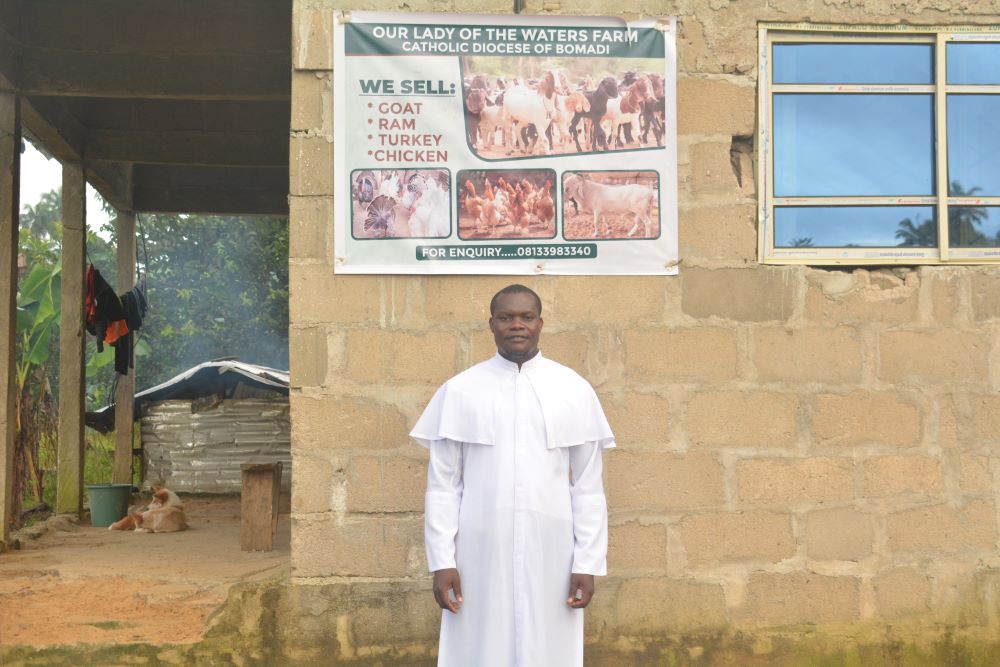Fr. Zachariah Fufeyin tends to animals at Our Lady of the Waters farm in Bayelsa, Nigeria's oil-rich region. He raises pigs, rabbits, goats and sheep, with the primary goal of helping low-income women and families to increase their protein consumption. (Valentine Benjamin)
Fr. Zachariah Fufeyin lives in the Kpakiama community of Nigeria's Delta State, an oil-rich region on the Gulf of Guinea. Every morning, after celebrating Mass at St. Michaels Catholic Church, Fufeyin changes his cassock to workwear and heads straight out to attend to the needs of his livestock.
Here, at Our Lady of the Waters Farm located in the Ayamasa community of Bomadi, he rears pigs, rabbits, goats and sheep, with the primary goal of helping low-income women and families to increase their protein consumption. It is an important ministry in a country where a 2020 survey found that nearly half the population does not eat any protein in a given day.
Proclaiming the Gospel goes beyond preaching the word of God, so it's important to practically, physically, attend to the needs of people who are suffering, Fufeyin told NCR.
"Farming is another aspect of proclaiming the Gospel," Fufeyin said. "Many are usually surprised, seeing a priest engage in farming in this part of the world, forgetting that as priests, we are trained to minister to God's people for the sanctification of their souls."
'Farming is another aspect of proclaiming the Gospel.'
—Fr. Zachariah Fufeyin
A 2020 Nigerian Protein Deficiency Report found that 92.7 million Nigerians do not eat any protein in a day. The survey showed that about half the country's population of 206 million are protein deficient, as they lack access to sufficient food sources.
The report further indicated that poverty and high cost of living are major drivers of protein deficiency in the country.
Fr. Paul Preye, chancellor of the Catholic Diocese of Bomadi, has known Fufeyin 14 years and calls his multipurpose farming a "lifesaver."
"It is one of the fast-growing farms we have in our territory," Preye told NCR. "It is creating job opportunities for both skilled and unskilled workers who are Catholic and non-Catholic youths within and outside the Niger Delta region."
"Some are already employed as security agents, gardeners, marketers, accountants, veterinarians, carpenters, plumbers and engineers," he said.

Fr. Zachariah Fufeyin, a priest of the Catholic Diocese of Bomadi in Nigeria, runs Our Lady of the Waters Farm to help low-income women and families increase their protein consumption. (Valentine Benjamin)
Nigeria, Africa's most populous nation, stretching from the southern fringe of the Sahara to the Gulf of Guinea, struggles with poverty. Some 71 million people are living in extreme poverty, according to the World Poverty Clock, and 133 million people are classified as multidimensionally poor, according to National Bureau of Statistics data.
The country's economy is one of the largest in Africa. But while Nigeria's 2030 Agenda for Sustainable Development aspires to move more than 100 million Nigerians out of poverty, the citizens are weighed down by stalled income growth and rising prices.
Fufeyin knows this challenge well. He set up his multipurpose farm, which sits on 85 plots of land, in November 2019 to provide protein. Surplus goods are sold, and funds from the sales are reinvested in the farm.
During the 2022 flood disaster, which displaced some 1.3 million Nigerians, the farm provided 100 chickens to households taking temporary shelter in displacement camps in Bayelsa. It also donated 15% of its products to charity.
Fufeyin and his team at the farm collect applications from people who need protein support. "We try our best to seek funding from organizations, both international and local organizations," he said. "But if they don't respond, we try to augment that response to see that (the) majority of the people suffering have something to survive with."
Advertisement
Lucia Odubolu, 42, a widowed mother of nine, is one of his beneficiaries. She received a live chicken, rice, beef, one carton of noodles and vegetable oil when her community of Pakiama was hit by flood last year.
"My children and I had challenges with food and meat during that period. It was a difficult time for us. The crops on my farm were washed away by the flood and we had nothing to survive on," she said. "Fr. Zachariah's farm is like a support system for many of us who could not afford protein."
Fufeyin routinely posts on social media platforms within and outside the diocese listing livestock prices and offers the possibility of installment payment plans.
The installment plan runs about eight months, especially for people who want to have meat at festive periods like Christmas and the new year.
"Our farm is aimed at making people understand that even in your poverty, you can still help someone to get something," said Fufeyin, adding that "the basis for which we have established this farm is for people to know that God has blessed us and provided something we can use to survive what we are facing, and that is agriculture."
"We tell people that despite the hardship that they face, God still cares," he said.
Preye said Fufeyin is "a man who matches words with action."








